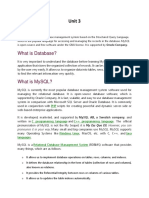NOTES
NOTES
Uploaded by
Islamic IndiaCopyright:
Available Formats
NOTES
NOTES
Uploaded by
Islamic IndiaOriginal Description:
Copyright
Available Formats
Share this document
Did you find this document useful?
Is this content inappropriate?
Copyright:
Available Formats
NOTES
NOTES
Uploaded by
Islamic IndiaCopyright:
Available Formats
What is the difference between Equi Join and Inner Join in SQL?
An equijoin is a join with a join condition containing an equality operator. An
equijoin returns only the rows that have equivalent values for the specified
columns.
An inner join is a join of two or more tables that returns only those rows
(compared using a comparison operator) that satisfy the join condition.
Syntax:EQUI JOIN
SELECT column_list
FROM table1, table2....
WHERE table1.column_name =
table2.column_name;
or
SELECT *
FROM table1
JOIN table2
[ON (join_condition)]
INNER JOIN
SQL Code:
SELECT foods.item_name,foods.item_unit,
company.company_name,company.company_city
FROM foods
INNER JOIN company
ON foods.company_id =company.company_id;
SELECT *
FROM company
NATURAL JOIN foods;
SELECT *
FROM table1
LEFT [ OUTER ] JOIN table2
ON table1.column_name=table2.column_name;
public static void main(String args[])
{
Map<String, Integer> hm
= new HashMap<String, Integer>();
hm.put("a", new Integer(100));
hm.put("b", new Integer(200));
hm.put("c", new Integer(300));
hm.put("d", new Integer(400));
// Traversing through the map
for (Map.Entry<String, Integer> me : hm.entrySet()) {
System.out.print(me.getKey() + ":");
System.out.println(me.getValue());
}
import java.sql.*;
DriverManager.registerDriver(new oracle.jdbc.driver.OracleDriver());
OR
Class.forName("oracle.jdbc.driver.OracleDriver");
Connection conn = DriverManager.getConnection(URL, username, passwd);
Connection conn = DriverManager.getConnection(URL);
Iterator iterator = list.iterator();
System.out.println("List elements : ");
while (iterator.hasNext())
System.out.print(iterator.next() + " ");
ListIterator iterator = list.listIterator();
// Traversing the list in forward direction
System.out.println("Displaying list elements in forward direction : ");
while (iterator.hasNext())
System.out.print(iterator.next() + " ");
Statement executeQuery(String query) is used to execute Select queries and
returns the ResultSet.
Statement executeUpdate(String query) is used to execute Insert/Update/Delete
(DML) statements or DDL statements that returns nothing.
Statement execute(String query) is used to execute any SQL query and it returns
TRUE if the result is an ResultSet such as running Select queries.
Statement: Used for general purpose access to the database and executes a static
SQL query at runtime.
PreparedStatement: Used to provide input parameters to the query during execution.
CallableStatement: Used to access the database stored procedures and helps in
accepting runtime parameters
You might also like
- Oracle 1z0-082 Questions & AnswersDocument71 pagesOracle 1z0-082 Questions & AnswersYuri Carvalho Marques100% (2)
- SQL Fundamentals I Solutions 05Document2 pagesSQL Fundamentals I Solutions 05asrii82% (38)
- Amcat English QuestionDocument25 pagesAmcat English QuestionIslamic India100% (1)
- Dbms Practical FileDocument29 pagesDbms Practical Fileshantanu singhNo ratings yet
- SQLite TutorialDocument8 pagesSQLite TutorialGomathyNo ratings yet
- Module 5 Assignment Java (MCA)Document16 pagesModule 5 Assignment Java (MCA)TCS110-Riya SinghNo ratings yet
- SBMS 6am 24012023Document4 pagesSBMS 6am 24012023maharanarajib441No ratings yet
- SQLDocument6 pagesSQLNisha SinghNo ratings yet
- Class Presentations On Object Oriented Programming by Subhash Chand AgrawalDocument49 pagesClass Presentations On Object Oriented Programming by Subhash Chand AgrawalEshan RathoreNo ratings yet
- java 1.8Document3 pagesjava 1.8SureshNo ratings yet
- Nested Queries and Join QueriesDocument6 pagesNested Queries and Join QueriesRevathimuthusamy100% (1)
- Background: Alter TableDocument31 pagesBackground: Alter Tablekerya ibrahimNo ratings yet
- Java8 CODING Questions OnlyDocument11 pagesJava8 CODING Questions Onlymythra1994No ratings yet
- Import Data From XLS andDocument12 pagesImport Data From XLS andShakir Surti0% (1)
- Practical No 8 Group FunctionDocument4 pagesPractical No 8 Group Functioneng.rashidrasheed786No ratings yet
- JDBCDocument8 pagesJDBCRahul SharmaNo ratings yet
- Slide 2Document68 pagesSlide 2dejenedagime999No ratings yet
- 20BCS9188 Abhishek Pandey EXP 4Document4 pages20BCS9188 Abhishek Pandey EXP 4OK BOSSNo ratings yet
- Advanced Table Functionalities in OAF!Document5 pagesAdvanced Table Functionalities in OAF!Vijay KishanNo ratings yet
- AnkitSingh 51Document11 pagesAnkitSingh 510211cse089No ratings yet
- SQL PracticalDocument13 pagesSQL PracticalabhiroopnigoteNo ratings yet
- JDBC Part-3Document13 pagesJDBC Part-3Saim KeshriNo ratings yet
- PharmacyDocument13 pagesPharmacykenabadane9299No ratings yet
- Pharmacy2Document13 pagesPharmacy2kenabadane9299No ratings yet
- SQL FunctionsDocument3 pagesSQL Functionsvamshikrishnat121No ratings yet
- Himalayan Group of Professional Institutions Kala Amb, Sirmaur, H.PDocument16 pagesHimalayan Group of Professional Institutions Kala Amb, Sirmaur, H.PSanjeevKumarNo ratings yet
- School of Information Technology and Engineering: Swe2005-Software TestingDocument24 pagesSchool of Information Technology and Engineering: Swe2005-Software TestingpoojaNo ratings yet
- Lecture 1 Overview: Two Things in BackendDocument21 pagesLecture 1 Overview: Two Things in Backendwec11011No ratings yet
- Advanced Java Java8 FeaturesDocument9 pagesAdvanced Java Java8 FeaturesPriya SolapureNo ratings yet
- View - Triggers-FunctionDocument7 pagesView - Triggers-Functiondang le ducNo ratings yet
- WT Lab9Document3 pagesWT Lab9vidyush.2125cse1046No ratings yet
- OA Framework - Dibyajyoti Koch - A Blog On Oracle ApplicationDocument44 pagesOA Framework - Dibyajyoti Koch - A Blog On Oracle ApplicationMostafa TahaNo ratings yet
- Mysql Installation and JDBC Connectivity: Unit VDocument36 pagesMysql Installation and JDBC Connectivity: Unit VBhavithraRameshNo ratings yet
- EXPT4 NewDocument13 pagesEXPT4 Newnimish.sarpandeNo ratings yet
- Final Advance Java2019Document44 pagesFinal Advance Java2019Rohan RathodNo ratings yet
- Java PointsDocument18 pagesJava PointsHarikrishna ShenoyNo ratings yet
- C Session 11Document48 pagesC Session 11eshamuNo ratings yet
- Java JDBC Apache Derby CommandsDocument18 pagesJava JDBC Apache Derby CommandsTitu Abdu AhmadNo ratings yet
- Language Elements: ClausesDocument6 pagesLanguage Elements: ClausesAMG65RNo ratings yet
- Program Final JavaDocument29 pagesProgram Final JavaAppin ChaaNo ratings yet
- Basic Commands of SQLDocument63 pagesBasic Commands of SQLsoumya sahuNo ratings yet
- The CREATE TABLE Statement Is Used To Create A Table in A DatabaseDocument17 pagesThe CREATE TABLE Statement Is Used To Create A Table in A DatabaseRitu KapurNo ratings yet
- BigdatalabreDocument21 pagesBigdatalabreRafi ShaikNo ratings yet
- All About ArrayListDocument8 pagesAll About ArrayListprincessNo ratings yet
- Interview SQLDocument22 pagesInterview SQLSandeep GantaNo ratings yet
- Update Result SetDocument2 pagesUpdate Result Setetest2272No ratings yet
- List of SQL Commands - CodecademyDocument9 pagesList of SQL Commands - Codecademyaqua2376No ratings yet
- Java - StreamsDocument10 pagesJava - Streamsbikashghoshh41No ratings yet
- Positve or Negitive SkewedDocument5 pagesPositve or Negitive SkewedchirusagarNo ratings yet
- Javafx TableviewDocument3 pagesJavafx TableviewKaka KakaNo ratings yet
- SQL Interview QuestionsDocument7 pagesSQL Interview Questionschaitu5422No ratings yet
- Sub QueriesDocument15 pagesSub Queries10pushpendaNo ratings yet
- ASS4Document4 pagesASS4dharmikrabadiya19No ratings yet
- Data Warehousing: Assignment # 01Document16 pagesData Warehousing: Assignment # 01pakizaamin436No ratings yet
- AJPChapter3PPT JDBCDocument16 pagesAJPChapter3PPT JDBCSumedh DahiwaleNo ratings yet
- How Does JDBC Work Details About JDBC How To Set Up An Access Database in Windows A JDBC Example SQLDocument8 pagesHow Does JDBC Work Details About JDBC How To Set Up An Access Database in Windows A JDBC Example SQLGuru PraveenNo ratings yet
- Java Ex10 ShelvaDocument5 pagesJava Ex10 Shelvasumathi palaniswamiNo ratings yet
- Name: Date Performed: RatingDocument2 pagesName: Date Performed: RatingTatski PursigidoNo ratings yet
- Latest Oops PracticalDocument19 pagesLatest Oops Practicalchakrabortypremansu21No ratings yet
- JDBCDocument6 pagesJDBCiamnotfucchaNo ratings yet
- SQL Commands - CodecademyDocument8 pagesSQL Commands - CodecademyshivakumarhlokeshNo ratings yet
- Advanced SAS Interview Questions You'll Most Likely Be AskedFrom EverandAdvanced SAS Interview Questions You'll Most Likely Be AskedNo ratings yet
- API DocsDocument73 pagesAPI DocsIslamic IndiaNo ratings yet
- Standalone Decision Master (Complete) .XLSX - 0Document5 pagesStandalone Decision Master (Complete) .XLSX - 0Islamic IndiaNo ratings yet
- NON-Life - Omniscan Post Installation Configuration Manual For WorkflowDocument12 pagesNON-Life - Omniscan Post Installation Configuration Manual For WorkflowIslamic IndiaNo ratings yet
- Read MeDocument1 pageRead MeIslamic IndiaNo ratings yet
- LKJ PDFDocument17 pagesLKJ PDFIslamic IndiaNo ratings yet
- NON-Life - Omniscan4.1 SOP InstallationDocument7 pagesNON-Life - Omniscan4.1 SOP InstallationIslamic IndiaNo ratings yet
- Ourse Notes Ogistic Egression: Course Notes: Descriptive Statistics Course Notes: Descriptive StatisticsDocument6 pagesOurse Notes Ogistic Egression: Course Notes: Descriptive Statistics Course Notes: Descriptive StatisticsIslamic IndiaNo ratings yet
- AgeDocument3 pagesAgeIslamic IndiaNo ratings yet
- Compiler Design 1Document37 pagesCompiler Design 1Islamic IndiaNo ratings yet
- Competative Coding NotesDocument4 pagesCompetative Coding NotesIslamic IndiaNo ratings yet
- Breadth First Search (Level Search)Document2 pagesBreadth First Search (Level Search)Islamic IndiaNo ratings yet
- StartDocument1 pageStartIslamic IndiaNo ratings yet
- Live Migration of Virtual MachinesDocument26 pagesLive Migration of Virtual MachinesIslamic IndiaNo ratings yet
- Create Procedure AS Select From Where AND: 'London' 'WA1 1DP'Document3 pagesCreate Procedure AS Select From Where AND: 'London' 'WA1 1DP'Islamic IndiaNo ratings yet
- Easy Maintenance: What Is Cloud Computing, in Simple Terms?Document8 pagesEasy Maintenance: What Is Cloud Computing, in Simple Terms?Islamic IndiaNo ratings yet
- RGPV NotesDocument90 pagesRGPV NotesIslamic India100% (1)
- Ex No:1 Datadefinition Commands, Data Manipulation Commands For Inserting, Deleting, Updating and Retrieving Tables and Transaction ControlstatementsDocument26 pagesEx No:1 Datadefinition Commands, Data Manipulation Commands For Inserting, Deleting, Updating and Retrieving Tables and Transaction ControlstatementsSandeep RavikumarNo ratings yet
- LMS-DBMS Lab ManualDocument21 pagesLMS-DBMS Lab ManualJAYA GANESH100% (1)
- Name: Roll # Class ID: 103752Document5 pagesName: Roll # Class ID: 103752Muhammad Adnan KhalidNo ratings yet
- Enroll. No. - : Marwadi UniversityDocument4 pagesEnroll. No. - : Marwadi UniversityRudrik BhattNo ratings yet
- Joins: 1.inner JoinDocument9 pagesJoins: 1.inner JoinKumoulica KumoulicaNo ratings yet
- VB & SQLDocument43 pagesVB & SQLAbejah PaculdoNo ratings yet
- TableauDocument16 pagesTableaubabjeereddyNo ratings yet
- SQL Join: Different Types of SQL JoinsDocument5 pagesSQL Join: Different Types of SQL JoinsHassan KhanNo ratings yet
- DBMS Unit4Document8 pagesDBMS Unit4Andriya BijuNo ratings yet
- Advance SQLDocument114 pagesAdvance SQLeidoscolinaNo ratings yet
- SQL SyllabusDocument3 pagesSQL SyllabusJayanth DNo ratings yet
- Rdbms LABDocument41 pagesRdbms LABDhanesh WaranNo ratings yet
- MySQL Aggregate FunctionDocument35 pagesMySQL Aggregate FunctionAbhinandan S GowdaNo ratings yet
- Baze de Date - OracleDocument12 pagesBaze de Date - OracleŞerban Albert-VasileNo ratings yet
- RDBMS 4330702Document9 pagesRDBMS 4330702Ankit Kakadiya07No ratings yet
- Comparative Analysis of Join Types Join: ID NameDocument8 pagesComparative Analysis of Join Types Join: ID NameM Saleh ButtNo ratings yet
- SQL Queries Examples Manual TestingDocument7 pagesSQL Queries Examples Manual TestingMohan Adari100% (1)
- SQL Interview QuestionsDocument48 pagesSQL Interview QuestionsRutuja KadamNo ratings yet
- Informatica HandbookDocument182 pagesInformatica Handbookvinay.muraharaNo ratings yet
- CH 1 Querying and SQL Functions 2023-24Document38 pagesCH 1 Querying and SQL Functions 2023-24ironfist12389No ratings yet
- CH 7 - Introduction To SQL and Its Commands For Board ExamDocument28 pagesCH 7 - Introduction To SQL and Its Commands For Board ExamameentrafiqNo ratings yet
- Database Practices SyllabusDocument4 pagesDatabase Practices SyllabusDinesh KumarNo ratings yet
- SQL Tutorial PDFDocument43 pagesSQL Tutorial PDFAkki ash100% (1)
- Unit 3 PHPDocument39 pagesUnit 3 PHPWilliam KugaNo ratings yet
- Sopcast AdreseDocument41 pagesSopcast AdreseBogdan TomNo ratings yet
- ABAP Chapter 3: Open SQL Internal TableDocument101 pagesABAP Chapter 3: Open SQL Internal TableArun Varshney (MULAYAM)No ratings yet
- Shivam Cs PracticalDocument50 pagesShivam Cs Practicalshivamsharma0503No ratings yet
- CampusX DSMP SyllabusDocument48 pagesCampusX DSMP Syllabussayantan palNo ratings yet










































































































